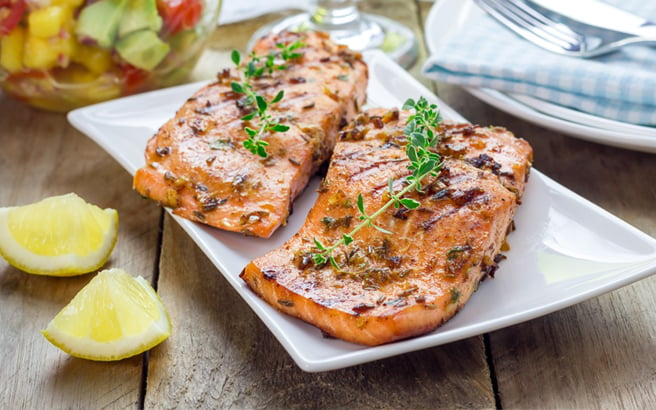 Zoe is a registered nurse and Master of Public Health student at King’s College London. She is currently an intern in the science team at World Cancer Research Fund. Follow her on Twitter @Zoe___Anderson.
Zoe is a registered nurse and Master of Public Health student at King’s College London. She is currently an intern in the science team at World Cancer Research Fund. Follow her on Twitter @Zoe___Anderson.
We know that eating too much red meat can increase our risk of bowel cancer – but what can we eat instead?
Fish is often highlighted as a healthy alternative to red meat. Oily fish, such as salmon, trout and fresh tuna, is particularly good for us and its benefits are certainly not limited to reducing cancer risk.
Oily fish contain a wide range of nutrients, each with their own particular health benefit.
- Omega-3 fatty acids
Interest in the protective effects of oily fish was first sparked by the observation that Inuit people in Greenland, who consume plenty of oily fish, suffer much fewer heart attacks and strokes than other Western populations.

As well as supporting heart health, omega-3 has been shown to enhance memory and cognitive performance, and to reduce the risk of Alzheimer’s disease. Omega-3 is particularly important for women who are pregnant or breastfeeding as it supports the development of the baby’s nervous system.
- Selenium
Selenium is an antioxidant which protects our immune system, prevents inflammation associated with some cancers, supports our metabolism, improves circulation and supports male fertility. We also require selenium for healthy hair, skin and nails!
- Vitamin D
Vitamin D helps with healthy bones, teeth and muscles. Over the winter, we don’t absorb enough vitamin D from the sun, so that’s a crucial time to make sure we have lots of vitamin D in our diets.
- Vitamin B3, B6 and B12
These vitamins are essential for the good health of our metabolism, blood cell formation and nervous system.

Making fish a regular part of our diet
Britain’s most popular oily fish is salmon, but other widely available types include mackerel, sardines, kippers, anchovies, pilchards and herring.
Most of us don’t consume the recommended two portions of fish per week (including at least one 140g portion of oily fish). Could it be that we simply aren’t sure what to do with fish that isn’t battered or breaded?
For help with ways of preparing fish, look no further than World Cancer Research Fund’s new cookbook Solely Fish. With the support of two-Michelin-starred chef Nathan Outlaw, we have created seven tasty and nutritious fish-based recipes using a variety of healthy cooking methods.
On each page of Solely Fish you’ll also find some top tips on alternative cooking methods and seasoning suggestions.
Download your free copy of Solely Fish today and revolutionise your mealtimes with recipes including Oriental Fish Cakes and Herby Fish ‘n Chips.

